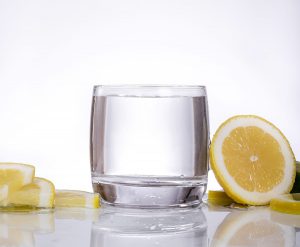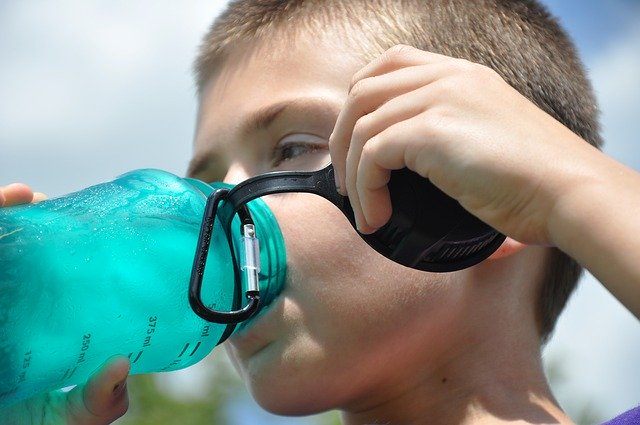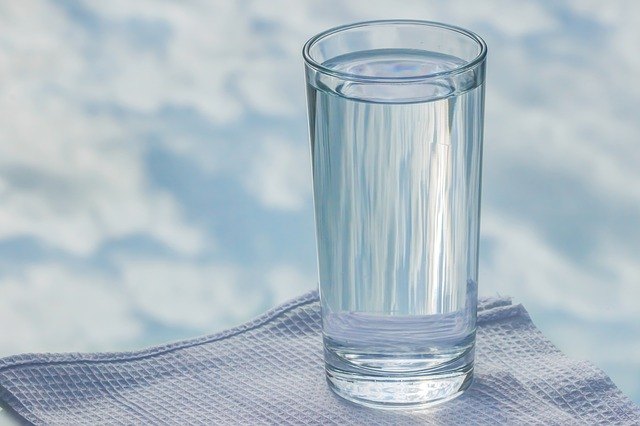Your body is approximately 70% water which explains why drinking water is key for optimal health.
It's likely you already know that not getting enough water has many bad side effects. But did you know you also need to pay attention to HOW to drink water as well?
The teachings of Ayurveda recommend that the way you drink water impacts your health and well-being.
In The Complete Book of Ayurvedic Home Remedies, Dr. Vasant Lad puts forth several theories from ancient Ayurvedic scriptures on drinking water that have stood the test of time.
Here's some wise Ayurvedic advice on how to drink water.
How To Drink Water According To Ayurveda
Most people recommend drinking 8 glasses of water every day, but according to Ayurveda every person has a unique constitution and requires different amounts of water to stay hydrated.
Water nurtures and lubricates. It is associated with lunar energy. It also helps with digestion and detoxifies when it flows out of the body as urine.
Healing Water
One very important thing to keep in mind is that the body is not a sponge. Water, when properly absorbed by your body, has several healing qualities:
- Helps to remove fatigue
- Enhances the radiance of your skin
- Prevents constipation
- Increases strength and stamina
- Helps digestion
- Cools the body and mind
- Anti-oxidant
- Life-giving
When and How You Should Drink Water
How much water you need depends on your age, how much physical work or exercise you do, the weather, your diet, stress levels, your herbal food supplements, and your body type.
Pitta types usually are thirstier than the watery Kapha types. Vata types are often constipated or have dry skin and thus need to drink water more.
The first thing you want to do every morning is to drink a large glass of water to flush your intestines and digestive tract.
You can then sip water throughout the day or take another 8 ounces an hour or so before each meal.
Water at meals
Ayurvedic texts recommend sipping plain water at meals. Water at meals can be room temperature or hot, but never be ice-cold, as that would douse the digestive fire.
How much water you need during a meal depends on what you’re eating.
If you are eating soup, you’ll need much less water. If you are eating drier foods, such as crackers, you’ll need more.
Your body needs a bit of fluid in order to make the food somewhat liquid. That’s why many cultures serve a cup of tea or soup with every meal or some others drink a bowl of broth before meals.
Cook Your Water
It's a well-known Ayurvedic fact that boiled water becomes lighter. By boiling your water, it becomes easier for the body to digest and absorb to obtain the needed nutrients.
So, boil spring or filtered water for 10 minutes, cool it down, and store it in a covered container. In this way, the body will easily digest it and it will soothe inflammation in the body.
Drinking boiled water while still warm is even more beneficial.
- Hot water promotes hunger and improves digestion
- It provides benefits for the throat and cleanses the urinary tract
- It can reduce bloating, hiccups, and aggravation of Vata and Kapha doshas
- It can reduce fever, asthma, and cough
- Soothes pain in the back and hips and stimulates the removal of accumulated, undigested food
Begin Your Day With a Tall Glass of Water
Begin each day with a tall glass of room temperature water. Sip it slowly to hydrate, and flush the kidneys, intestines and detoxify the body.
 You can also squeeze half of a lemon into this water if you are trying to shed weight as lemon suppresses body fat.
You can also squeeze half of a lemon into this water if you are trying to shed weight as lemon suppresses body fat.
Drink Room Temperature Water
Ayurveda suggests drinking room temperature water because if the water is too cold, it can provoke Kapha disorders like colds, coughs, and sore throat. Also, cold water is known to slow digestion and lower immunity by destroying digestive juices.
Room temperature water helps to keep your arteries clean and control cholesterol. In addition, it helps to encourage weight loss and reduce bloating and pain.
Drink Water Only When You are Thirsty

Ayurveda suggests drinking water only when you are thirsty. This is because every person has a unique body type (doshas) and so, drinking the same amount of water should not be recommended to every person.
Your body cannot absorb too much water, so it is important to wait for cues from your body.
Know Your Thirst Indicators
One of the cues to let you know your body needs water is the color of your urine.
If your urine is a dark yellow color, it can mean you are dehydrated.
If your urine is fairly clear and light in color, that is a sign your body is adequately hydrated.
Take note of these cues as they could turn into health problems.
Sit to Drink
Just like eating, Ayurveda suggests you sit to drink. This is because if you stand to drink, you are more likely to disturb the balance of fluids in your body. This can cause water to accumulate in the joints potentially causing chronic inflammation and stiffness.
But if you sit to drink, this allows your nervous system and muscles to relax which improves absorption. More importantly, you will be doing your kidneys a big favor because sitting down allows better kidney filtration.
Drink water Stored in Copper Containers

Drinking from a copper vessel is an ancient Ayurvedic practice with many health benefits.
- Helps to balance all three doshas
- Improves digestion – Properties that help kill bacteria and reduce inflammation
- Supports weight loss – Helps break down fat and eliminate it more efficiently
- Helps heal wounds – anti-bacterial, anti-viral, and anti-inflammatory properties
- Supports heart health – Copper is found to help regulate blood pressure
- Protects you from infections – Copper can destroy bacteria effectively
- Regulates the thyroid gland – People with thyroid diseases usually have low levels of copper
- Helps with arthritis and inflamed joints – Copper has potent anti-inflammatory properties
For the greatest benefits, store only room-temperature pure water in your copper water bottle overnight. When you wake up drink one glass and then space two more glasses throughout your day.
Make Spice Water
1. Coriander, Cumin, and Fennel Seeds
Add five seeds of each spice with every 1/2 cup of water when boiling. Make sure you strain the seeds before you drink. This mixture will stimulate your digestion and the cleansing process.
2. Cardamom, Sandalwood, and Mint
During the hot summer months, these herbs will reduce pitta irritability. Add a pinch of powdered herb or a few leaves of mint in cool water and enjoy the cooling effect.
3. Honey
Add half a teaspoon of raw honey in cool water and this drink will help you lose weight and remove excess Kapha.
4. Ginger
Ginger is celebrated for its limitless benefits especially when used in the morning. A combination of a glass of water and a pinch of ginger powder can reduce the digestive fire and reduce Vata and Kapha excess.
5. Gold
You might be surprised by this, but gold is an important booster of immunity. You won’t add the gold to your water, but just put it into the water when you boil it. Make sure it is 22k or even higher.
Ayurveda Lifestyle Products




